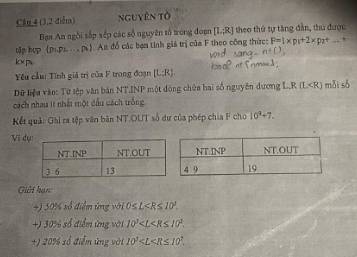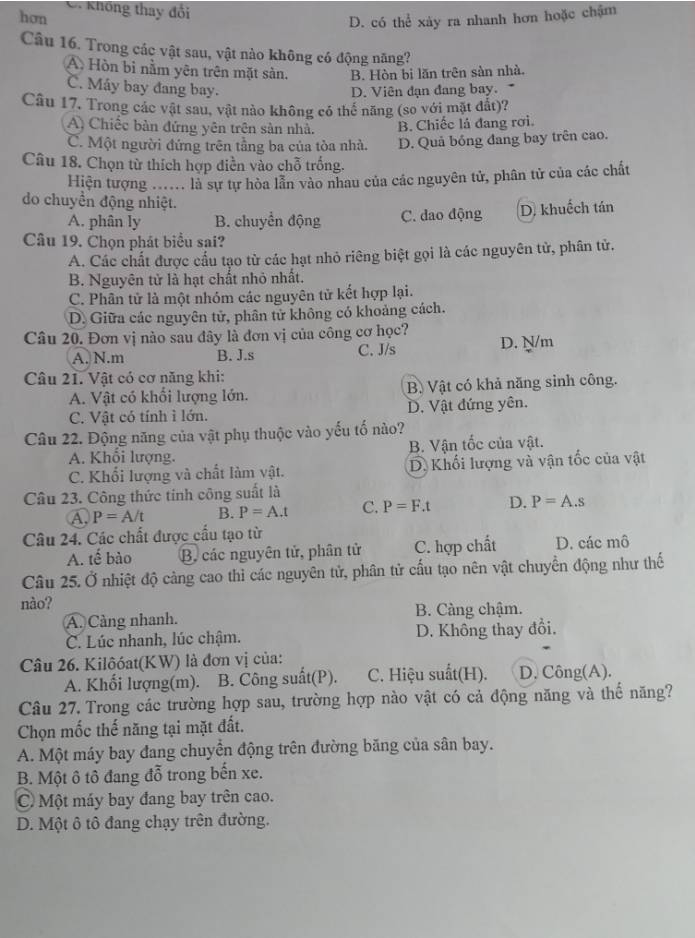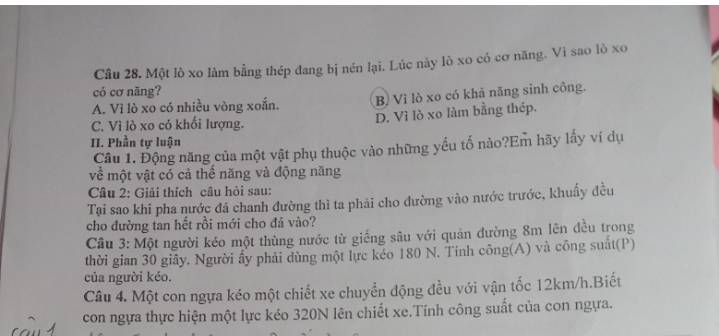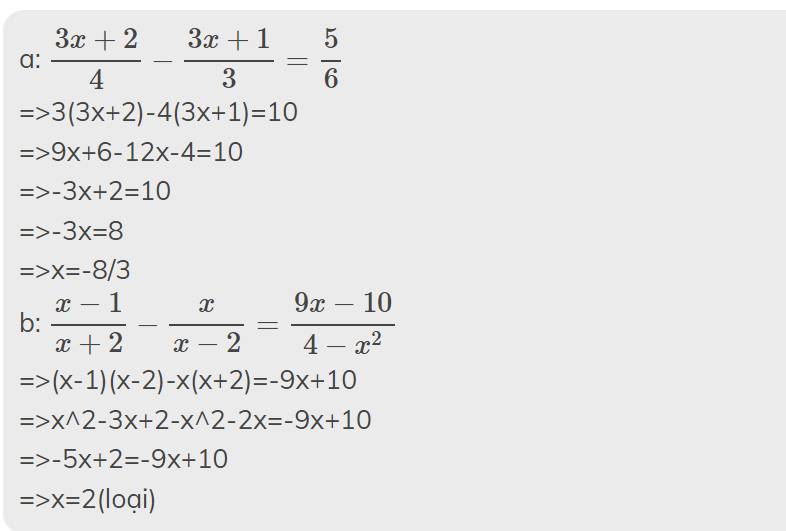|4-3x|-x=1 nhờ mn giải giúp em cái ạ!
Hãy nhập câu hỏi của bạn vào đây, nếu là tài khoản VIP, bạn sẽ được ưu tiên trả lời.



a: \(\Leftrightarrow4\left(2x+1\right)-3\left(6x-1\right)=2x+1\)
=>8x+4-18x+3=2x+1
=>-10x+7=2x+1
=>-12x=-6
hay x=1/2
b: \(\Leftrightarrow4x^2-12x+7x-21-x^2=3x^2+6x\)
=>5x-21=6x
=>-x=21
hay x=-21

`48/[x+4]+48/[x-4]=5` `ĐK: x \ne +-4`
`<=>[48(x-4)+48(x+4)]/[(x-4)(x+4)]=[5(x+4)(x-4)]/[(x-4)(x+4)]`
`=>48x-192+48x+192=5x^2-80`
`<=>5x^2-96x-80=0`
`<=>5x^2-100+4x-80=0`
`<=>5x(x-20)+4(x-20)=0`
`<=>(x-20)(5x+4)=0`
`<=>` $\left[\begin{matrix} x=20\\ x=\dfrac{-4}{5}\end{matrix}\right.$ (t/m)
Vậy `S={-4/5;20}`
ĐK : \(x\ne\pm4\)
\(\Leftrightarrow\cdot\dfrac{48\left(x+4\right)+48\left(x-4\right)}{\left(x+4\right)\left(x-4\right)}=\dfrac{5\left(x+4\right)\left(x-4\right)}{\left(x+4\right)\left(x-4\right)}\)
\(\Leftrightarrow48x+192+48x-192==5x^2-80\)
\(\Leftrightarrow96x=5x^2-80\)
\(\Leftrightarrow5x^2-96x-80=0\)
\(\Leftrightarrow5x^2+4x-100-80=0\)
\(\Leftrightarrow4\left(x-20\right)+5x\left(x-20\right)=0\)
\(\Leftrightarrow\left[{}\begin{matrix}x-20=0\\5x=-4\end{matrix}\right.\Leftrightarrow\left[{}\begin{matrix}x=20\\x=-\dfrac{4}{5}\end{matrix}\right.\)

1/3x + 2 = 2x - 1/2
=>1/3x + 2x = 2 + ( - 1/2 )
7/3x = 3/2
x = 3/2 : 7/3
x = 9/14
a. 1/3x +2=2x-1/2
ta có: 2x-1/3x =2-1/2
(2-1/3)x =3/2
5/3x=3/2
x=3/2:5/3
x=9/10
mình nghĩ thế vì mình đang học lớp 5

Ta có: \(4\left|3x-12\right|+2x=1-x\)
\(\Leftrightarrow\left|12x-48\right|=1-3x\)
\(\Leftrightarrow\left[{}\begin{matrix}12x-48=1-3x\left(x\ge4\right)\\12x-48=3x-1\left(x< 4\right)\end{matrix}\right.\Leftrightarrow\left[{}\begin{matrix}15x=49\\9x=47\end{matrix}\right.\Leftrightarrow\left[{}\begin{matrix}x=\dfrac{49}{15}\left(loại\right)\\x=\dfrac{47}{9}\left(loại\right)\end{matrix}\right.\)

II. Phần tự luận
Câu 1: Động năng của một vật phụu thuộc vào khối lượng và vận tốc
Ví dụ về vật vừa có động năng vừa có thế năng: một chiếc lá đang rơi từ trên cây xuống
Câu 2: Vì nếu cho đá vào trước thì đường và chanh sẽ chậm hòa tan vàotrong nước do nhiệt độ càn cao thì các hạt nguyên tử phân tử chuyển động càng nhanh nên cần hòa tan đường và chanh vào trước để được hòa tan vào trong nước hơn rồi mới nên cho đá vào
II. Phần tự luận:
Câu 3:
Công thực hiện được:
\(A=F.s=180.8=1440J\)
Công suất của người kéo:
\(\text{℘}=\dfrac{A}{t}=\dfrac{1440}{30}==48W\)
Câu 4:
Đổi: \(12km/h=43,2m/s\)
Công suất của ngựa:
\(\text{℘}=\dfrac{A}{t}=\dfrac{F.s}{t}=F.\dfrac{s}{t}=F.\upsilon=320.43,2=13824W\)

\(1,\dfrac{3x+2}{6}-\dfrac{3x-2}{4}=\dfrac{15}{8}\\ \Leftrightarrow\dfrac{4\left(3x+2\right)}{24}-\dfrac{6\left(3x-2\right)}{24}-\dfrac{45}{24}=0\\ \Leftrightarrow12x+24-18x+12-45=0\\ \Leftrightarrow-6x-9=0\\ \Leftrightarrow x=-\dfrac{3}{2}\)
2, ĐKXĐ:\(x\ne\pm3\)
\(\dfrac{x+2}{3+x}-\dfrac{x}{3-x}=\dfrac{8x-6}{9-x^2}\\ \Leftrightarrow\dfrac{\left(x+2\right)\left(3-x\right)}{\left(3+x\right)\left(3-x\right)}-\dfrac{x\left(3+x\right)}{\left(3+x\right)\left(3-x\right)}-\dfrac{8x-6}{\left(3+x\right)\left(3-x\right)}=0\\ \Leftrightarrow\dfrac{-x^2+x+6-3x-x^2-8x+6}{\left(3+x\right)\left(3-x\right)}=0\\ \Leftrightarrow-2x^2-10x+12=0\\ \Leftrightarrow x^2+5x-6=0\\ \Leftrightarrow\left(x-1\right)\left(x+6\right)=0\\ \Leftrightarrow\left[{}\begin{matrix}x=1\left(tm\right)\\x=-6\left(tm\right)\end{matrix}\right.\)
\(a,\dfrac{3x+2}{6}-\dfrac{3x-2}{4}=\dfrac{15}{8}\)
\(\Leftrightarrow4\left(3x+2\right)-6\left(3x-2\right)=45\)
\(\Leftrightarrow12x+8-18x+12=45\)
\(\Leftrightarrow12x-18x=45-12-8\)
\(\Leftrightarrow-6x=25\)
\(\Leftrightarrow x=\dfrac{-25}{6}\)
Vậy \(S=\left\{\dfrac{-25}{6}\right\}\)
\(b,\dfrac{x+2}{3+x}-\dfrac{x}{3-x}=\dfrac{8x-6}{9-x^2}\left(ĐKXĐ:x\ne3;x\ne-3\right)\)
\(\Leftrightarrow\left(x+2\right)\left(3-x\right)-x\left(3+x\right)=8x-6\)
\(\Leftrightarrow3x-x^2+6-2x-3x-x^2=8x-6\)
\(\Leftrightarrow-x^2-x^2+3x-2x-3x-8x=-6+6\)
\(\Leftrightarrow-2x^2-10x=0\)
\(\Leftrightarrow-2x\left(x-5\right)=0\)
\(\Leftrightarrow\left[{}\begin{matrix}-2x=0\\x-5=0\end{matrix}\right.\Leftrightarrow\left[{}\begin{matrix}x=0\left(nhận\right)\\x=5\left(nhận\right)\end{matrix}\right.\)
Vậy \(S=\left\{0;5\right\}\)



